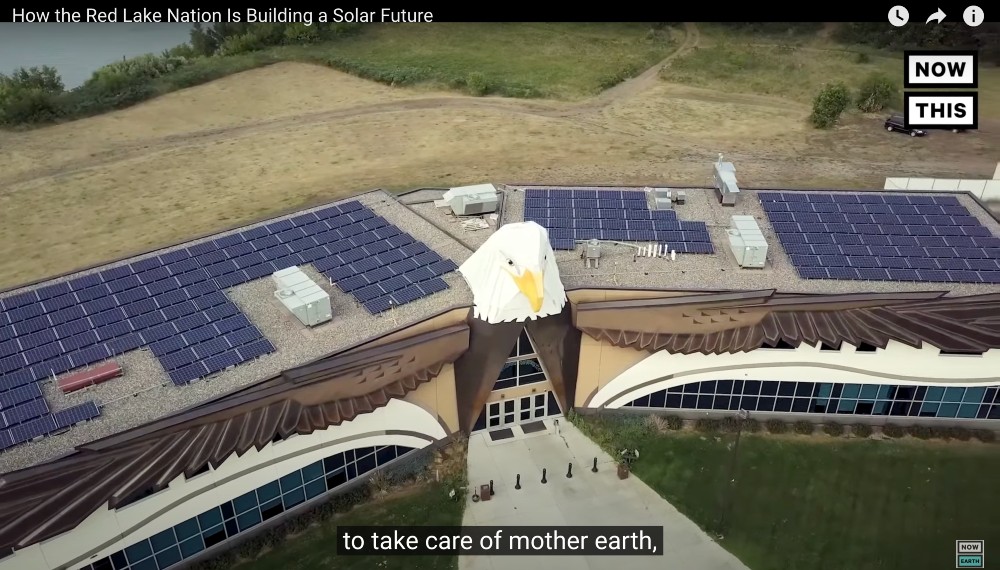
- Details
- By Kelsey Turner
On Wednesday, the Red Lake Band of Chippewa Indians became the first ever tribe to receive government approval for the creation of a Tribal Energy Development Organization (TEDO). The Department of the Interior’s Office for the Assistant Secretary for Indian Affairs’ approval of the Red Lake Band’s TEDO will support the Minnesota tribe’s ongoing effort to develop renewable energy resources.
A TEDO is a business organization in which the tribe owns majority interest. It allows a tribe to enter into and manage energy-related leases, rights-of-way and business agreements without obtaining Secretarial approval for each individual lease, right-of-way or agreement, according to Wednesday’s Indian Affairs press release.
“The Red Lake Band of Chippewa Indians is reclaiming its sovereign authority to control the development of energy resources,” said Assistant Secretary-Indian Affairs Bryan Newland in the press release. “This is an exciting development that will lead to greater energy security for their people’s comfort and prosperity.”
Want more Native News? Get the free daily newsletter today.
Red Lake submitted its application last December requesting Twenty-First Century Tribal Energy, Inc. be approved and certified as a TEDO. Indian Affairs’ approval will allow Red Lake to forgo Secretarial review when it enters into a lease, business agreement or right-of-way with the TEDO.
More Stories Like This
50 Years of Self-Determination: How a Landmark Act Empowered Tribal Sovereignty and Transformed Federal-Tribal RelationsFond du Lac Band of Lake Superior Chippewa Signs Cannabis Compact with State of Minnesota
Chickasaw Hall of Fame Nominations Now Accepted
Navajo Nation Council Approves Historic Legislation to Strengthen Veterans’ Representation
Navajo Nation Council to Convene 2025 Fall Session Amid Budget Cuts and Calls for Accountability
Help us tell the stories that could save Native languages and food traditions
At a critical moment for Indian Country, Native News Online is embarking on our most ambitious reporting project yet: "Cultivating Culture," a three-year investigation into two forces shaping Native community survival—food sovereignty and language revitalization.
The devastating impact of COVID-19 accelerated the loss of Native elders and with them, irreplaceable cultural knowledge. Yet across tribal communities, innovative leaders are fighting back, reclaiming traditional food systems and breathing new life into Native languages. These aren't just cultural preservation efforts—they're powerful pathways to community health, healing, and resilience.
Our dedicated reporting team will spend three years documenting these stories through on-the-ground reporting in 18 tribal communities, producing over 200 in-depth stories, 18 podcast episodes, and multimedia content that amplifies Indigenous voices. We'll show policymakers, funders, and allies how cultural restoration directly impacts physical and mental wellness while celebrating successful models of sovereignty and self-determination.
This isn't corporate media parachuting into Indian Country for a quick story. This is sustained, relationship-based journalism by Native reporters who understand these communities. It's "Warrior Journalism"—fearless reporting that serves the 5.5 million readers who depend on us for news that mainstream media often ignores.
We need your help right now. While we've secured partial funding, we're still $450,000 short of our three-year budget. Our immediate goal is $25,000 this month to keep this critical work moving forward—funding reporter salaries, travel to remote communities, photography, and the deep reporting these stories deserve.
Every dollar directly supports Indigenous journalists telling Indigenous stories. Whether it's $5 or $50, your contribution ensures these vital narratives of resilience, innovation, and hope don't disappear into silence.
 The stakes couldn't be higher. Native languages are being lost at an alarming rate. Food insecurity plagues many tribal communities. But solutions are emerging, and these stories need to be told.
The stakes couldn't be higher. Native languages are being lost at an alarming rate. Food insecurity plagues many tribal communities. But solutions are emerging, and these stories need to be told.
Support independent Native journalism. Fund the stories that matter.
Levi Rickert (Potawatomi), Editor & Publisher
